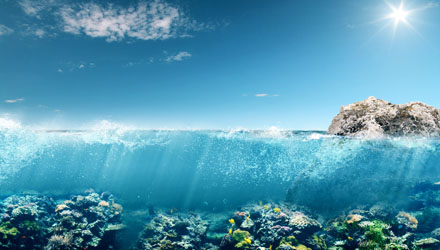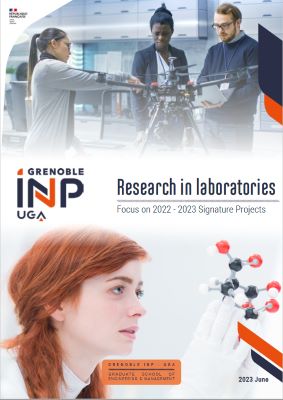The CHORUS industrial chair - a result of the collaboration between GIPSA-Lab and the Institut Universitaire Européen de la Mer - has an aim that is, to say the least, highly original: to monitor marine eco-systems without disturbing them by using the sounds they produce.

If you thought that the underwater world was a world of total silence, then think again! Animals, mammals, fish and shellfish all generate an unimaginable cacophony, says Cédric Gervaise, researcher at the GIPSA-Lab laboratory and co-holder of the chair with Lucia Di Iorio. Human activity, whether from shipping or producing hydroelectric power, for example, also creates noise that can be quantified and analysed.
The GIPSA-Lab's expertise in signal processing and underwater acoustics will be harnessed to develop tools for analysing and processing the sounds made by the seabed. These will first be captured and processed and then converted into reliable biological indicators by the scientific community. As a result we will have a better understanding of how marine eco-systems respond to global changes and human pressures. Numerous applications are possible: the preservation of marine biodiversity, monitoring of global warming in the Arctic, and the study of marine populations for, for example, the sensible management of marine protected areas.
Launched at the beginning of January 2013 by the Grenoble INP partnership foundation and directed by Jérôme Mars, head of GIPSA-Lab's Image and Signal Department, the chair is funded by private donors directly, in kind and through skills.

If you thought that the underwater world was a world of total silence, then think again! Animals, mammals, fish and shellfish all generate an unimaginable cacophony, says Cédric Gervaise, researcher at the GIPSA-Lab laboratory and co-holder of the chair with Lucia Di Iorio. Human activity, whether from shipping or producing hydroelectric power, for example, also creates noise that can be quantified and analysed.
The GIPSA-Lab's expertise in signal processing and underwater acoustics will be harnessed to develop tools for analysing and processing the sounds made by the seabed. These will first be captured and processed and then converted into reliable biological indicators by the scientific community. As a result we will have a better understanding of how marine eco-systems respond to global changes and human pressures. Numerous applications are possible: the preservation of marine biodiversity, monitoring of global warming in the Arctic, and the study of marine populations for, for example, the sensible management of marine protected areas.
Launched at the beginning of January 2013 by the Grenoble INP partnership foundation and directed by Jérôme Mars, head of GIPSA-Lab's Image and Signal Department, the chair is funded by private donors directly, in kind and through skills.




